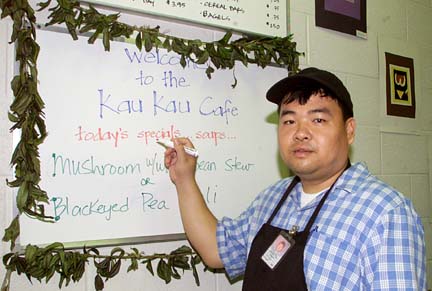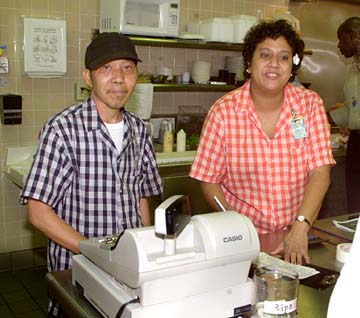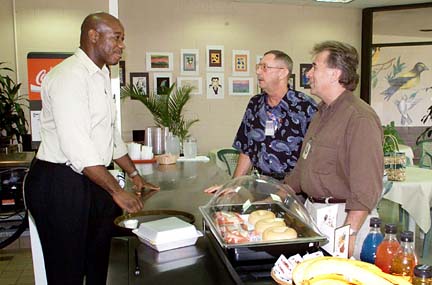


|
Duke Doan is getting a lot of enjoyment along with culinary experience and a paycheck at the Hawaii State Hospital's new Kau Kau Cafe. Hospital cafe serves
patients opportunitiesClients with mental illnesses at
3 Oahu sites get valuable experience
at the Kau Kau CafeBy Helen Altonn
haltonn@starbulletin.comA member of the Honolulu Clubhouse for high-functioning mental health clients, Doan works at the cafe cutting vegetables and "doing backups for the cook."
He said he's learned cooperation and teamwork and "to just make friends" through the program.
The new cafe not only offers tasty food as an option to the hospital cafeteria, but provides vocational training and experience for clients of the Honolulu, Koolau and Waipahu clubhouses.
The clubhouses, operated by the state Health Department's Adult Mental Health Division, provide training and job opportunities for stable clients with mental illness.
Opportunities also are available for some hospital patients to work in the Kau Kau Cafe as part of the occupational and industrial therapy programs, said administrator Paul Guggenheim.

|
The innovative cafe was developed in a partnership between the hospital; the clubhouses; the Office of United Self-Help, which assists with accounting and bookkeeping, and Steadfast Housing Development Corp., which provides support for those placed in jobs."It's a great concept and one of the few times a community-based agency has gotten involved with the State Hospital," said Guggenheim, a frequent diner at the cafe.
Another repeat customer is Bill Elliott, associate hospital administrator, who worked with the hospital's dietary manager, Rob Call, and vocational trainer Sean Priester to establish the enterprise in an unused facility on the grounds.
It's bright and airy, with tablecloths and drawings by patients giving it a home-like atmosphere.
Priester's background includes the Sunset Grill and Honolulu Club and, more recently, the Wild Mushroom, which he operated for the YWCA.
He developed recipes for the hospital cafe with cuisine he's comfortable with, as well as ideas from his staff. "They wanted something more local-style," he said.
Menus offer a variety of choices, from Roast Turkey Spinach Wrap in a Chili Tomato Tortilla ($5.25) to Marinated Ahi and Furikake Fried Rice ($5.95).

|
"The food is awfully damn good," Guggenheim said. "I'm hooked on turkey wraps." He said many employees order take-out lunches from the cafe, open from 10 a.m. to 2 p.m. Monday through Friday, and the hospital is looking to the cafe to cater big functions.Ten clubhouse members are working for Priester, handling all tasks from the grill and pantry to cashier. The pay scale is based on their ability to do certain levels of work, Elliott said.
Doan, who became ill about seven years ago, said the best thing about working there are the financial and medical benefits.
"Money is a reward," said Denise Tai, who helps train workers in a kitchen unit at the Honolulu Clubhouse and assists at the cafe. But, she added, "We don't advertise money for these guys."
Emphasis is placed on giving them "a normal life" as one of many steps enabling them to achieve independent living, she said.
For example, they must learn to get up on time and dress appropriately to go to work, which isn't that easy for some. Doan said he recently set his alarm to get up at 5:30 a.m., then went back to sleep until 6 a.m.
If a worker misses the clubhouse bus to take them to the hospital, a staff member fills in to guarantee coverage, Tai said. "They have good and bad days. We help them to stabilize."
Thus far, Priester said his employees are enthusiastic, willing to learn and listen. "Since day one, it has been incredible."
Doan is in a transitional program, the first of three employment phases at the clubhouse. Someone will take his place in six months, and the clubhouse will help him find supportive employment.
The workers had six weeks of training in different aspects of health, sanitation, safety and food preparation before the cafe opened, plus one day of hospital-related training.
''The training was really good," Doan said, "because it taught me to try to learn from listening, and not thinking I can or can't do that."
"What makes this unique," Tai said, "is we've never had a manager in training." Mark Nelson, a clubhouse member who just graduated from culinary art school at Kapiolani Community College, is a manager trainee in the Kau Kau Cafe, she said. "For all clubhouses, we celebrate for him."
Jobs and vocational training are the greatest needs across the country for anyone in behavioral health going into the community, Guggenheim said.
He sees the cafe as one of many potential hospital vocational training programs involving community agencies, such as groundskeeping, laundry, housekeeping and switchboard operations.
Meanwhile, he said his goal is to get mental health clients into restaurant and hotel jobs around Oahu. "If they can do it here, they can do it anywhere."